
Guests
- Hani Mansourianworked as an engineer and a humanitarian relief worker in Iran. He is currently a master’s student in international affairs at Columbia University.
Faced with the possibility of a U.S. attack, how are the Iranian people responding to the latest developments? And how has U.S. policy in the Middle East shaped Iranian public opinion? We speak with Hani Mansourian, a master’s student in international affairs at Columbia University. [includes rush transcript]
Transcript
AMY GOODMAN: We turn now to another Iranian in this country. Faced with the possibility of a U.S. attack, we want to continue on the theme of how are the Iranian people responding to these latest developments and how has U.S. policy in the Middle East shaped Iranian public opinion.
Hani Mansourian worked as an engineer and a humanitarian relief worker in Iran, currently a master’s student in international affairs at Columbia University, has spent his entire life in Iran. On Friday, Juan Gonzalez and I talked to him here in our firehouse studio, and we began by asking him his thoughts on the increasing tension between Washington and Tehran.
HANI MANSOURIAN: What is happening, in terms of the whole setting in the international arena and its reflection in Iran, people are becoming less and less hopeful to the changes, basically the pressures from abroad to put pressure on the government towards change for better, in terms of human rights, in terms of political freedom, in terms of social freedom. And the whole thing is basically pushing people to rally more around the government, the same government that they don’t necessarily like, but because it’s coming to a point that it’s becoming a national issue, the whole thing is pushing people more towards the government. And it also helps the government to continue with whatever plans they have in terms of domestic politics, because all the energy, which previously has been used up for changing small, small stuff, including human rights issues, using international pressure, is now spent on something, which is — for Iranian people, it’s irrelevant.
AMY GOODMAN: How much support does President Ahmadinejad have in Iran?
HANI MANSOURIAN: I would say he doesn’t have a very big support, but it’s not that he doesn’t have any. It’s, I would say, a very limited portion of the society, mainly people from lower levels, economically, I’m speaking. They are supporting him, and they’re mainly because of the approach that he had while running for presidency. But at the same time, people who have been hopeful for him are not seeing any impact on their lives. So, I have a feeling that even the support that he had — he used to have — is decreasing now.
JUAN GONZALEZ: Given the fact that Iran is such a developed nation in the Third World, has such a large educated class, how has this tension between Islamic fundamentalism and modernism, how has it played out in your life when you were living there and among those that you knew between the educated classes and the clerics?
HANI MANSOURIAN: I would say, unfortunately, the intellectuals chose a separate life from the rest of the society. So, what I mean by that is, one can live the same life that a European can live in Iran, but it doesn’t necessarily relate to the society. It’s not in relation to other people. It’s very separated and limited to their private spheres, basically. So you can find like — I mean, it’s famous. Everyone who goes to Tehran will talk about North Tehran. When you go to North Tehran, all these houses, very expensive houses, filled up with people educated abroad, very wealthy, but they don’t necessarily have any real relation with the actual population, with the majority of the population.
AMY GOODMAN: Hani Mansourian, can you talk about your family?
HANI MANSOURIAN: Yeah, my family is a social activist and political activist there — my mother and my father. And they have been active from before the revolution.
AMY GOODMAN: What happened to them after the revolution and before?
HANI MANSOURIAN: Before revolution, they were basically supporting —- not the revolution, because they believed that reform is what Iran needs, not necessarily a revolution, but -—
AMY GOODMAN: Were they opposed to the Shah?
HANI MANSOURIAN: They were opposed to the Shah and — but at the same time, they welcomed the revolution when the revolution happened, because anyway it was a change that they wanted. They necessarily didn’t want it to happen that way, but that was at least a positive step, and they were all very hopeful that things will change for better. But it didn’t.
And what happened was, after a very short period, they started becoming the same opposition that they used to be at the time of Shah and against the government. But they always chose peaceful activities and using media as their, basically, their approach towards changing — trying to change the government and remaining as a critique to the government all the time.
They have been in trouble several times. My father has been arrested illegitimately, without any charge, for — he has been kept in prison for years. And anyway, he is still active, mainly in the social sphere; he is running an NGO. My mom is running another NGO dealing with social issues in Iran.
JUAN GONZALEZ: Now, what was the impact of that long period of the Iran-Iraq War? Obviously, the United States helped to foment that war and backed Saddam Hussein in his efforts to battle the Khomeini regime. What was the impact of that — the terrible cost in lives of that war on the Iranian people?
HANI MANSOURIAN: I would split that question into two parts: one political part and the social life, I would say. For the social part, people basically, especially in the beginning, there were very — basically the nationalistic part of them was touched by the revolution, followed by war. So, although many lives were lost, people were not that dissatisfied for the first period of war up to the point that Khorramshahr was released. I think it was 1982. And then the war continued, because in the political sphere, the government was taking advantage of what was happening. Basically, the external enemy was there, so that they could always point their fingers to the external enemy and make sure that whoever tries to change things inside locally will not take it anywhere and it will be — the oppression was very heavy, and the media was not covering the oppression and the killings inside the jails.
AMY GOODMAN: Do you see a correlation to today? Here you’re 20 years later. You have a tremendous external threat, as perceived, I’m sure, within Iran, with the U.S. saying they’re going to strike Iran. Is there a same kind of crackdown going on inside, that if you oppose the government, you’re allied with the enemy, the United States?
HANI MANSOURIAN: I think it’s probably not that strong now. But people are feeling the signs, basically seeing the signs. The signs are coming. It’s not yet there. But everyone talks about — all the people who have experienced war, they’re talking about the same thing happening if the United States attacks, meaning that if United States attacks Iran, the same kind of oppression will happen again, because, again, the external enemy would basically give rise to the nationalistic part of people, and the government can take advantage of that.
AMY GOODMAN: And what would you do? You’re an Iranian student here in the United States.
HANI MANSOURIAN: I’ll probably not be able to stay here, from, like, personal side. I won’t be able to stay here and witness my family, my friends, my people, everything that I love is getting destroyed, and I’m sitting here, although I probably won’t be able to do anything big against it, even if I go back. And I might be drafted, because I was exempted from the military service because of my father’s age. But if war happens, then it’s very possible that I have to go to military service, which is not what I want, not because I don’t want to go to military service, but I don’t believe in wars. Anyway, so I would probably go back and will probably — if I have to choose — will probably choose to stand with my own government, which I don’t agree with in lots of different areas, but that’s probably what I will choose to do.
JUAN GONZALEZ: During the period of the Shah, there were thousands upon thousands of Iranians who came to the United States for college education. Where do Iranian students go today, when they go abroad to seek higher education?
HANI MANSOURIAN: They are still — I would say the United States is their best choice. I mean, everyone initially chooses to come to the United States. Then, Europe and Australia has become huge, Canada recently. I have seen people who are going to Malaysia, Indonesia for higher education. But higher education in Iran is actually not bad, I would say. So there are lots of people who are staying in Iran and getting higher education, master’s degrees and Ph.D.s, without too much — I mean, although it’s difficult to get into the programs, but it is possible.
AMY GOODMAN: Do you feel pressure here, Hani, as an Iranian right now?
HANI MANSOURIAN: In terms of direct, like, people’s behavior, or —?
AMY GOODMAN: Anywhere?
HANI MANSOURIAN: I mean, I feel — the pressure that I feel is the fact that the human parts of us, which should easily relate me to an American, works up to the point that, I would say, media comes in. That part doesn’t have any — I mean, I don’t have any trouble creating relation, human relation with Americans, but when it comes to the mentality that have been basically imposed by the media, I just cannot imagine — I couldn’t imagine how powerful media can be and how worlds apart I can be from American people, just because media is feeding them with what they want.
JUAN GONZALEZ: One big story that comes to mind was when the President Ahmadinejad was here at the United Nations General Assembly, he was scheduled to speak at Columbia University, and the president of the university ordered the speech cancelled. What was your reaction to Columbia as a bastion supposedly of free speech, canceling the speech of your president there?
HANI MANSOURIAN: That was my first disappointment of Columbia University, because although, again, I don’t agree with what Ahmadinejad is saying, but, as you say, freedom is speech is what I expected to be real here. But it doesn’t seem to be that way.
AMY GOODMAN: And finally, just your words to the American people as the pressure ratchets up, looks like sanctions will be again imposed on Iran. The U.S. is positioning warships in the Middle East focusing on Iran.
HANI MANSOURIAN: I would say, first, sanctions as usual — sanctions will not affect the politicians, people sitting up there making controversial statements. They will continue doing that, and they will not suffer. And that’s — it’s the people of Iran who will suffer from this, the same people who don’t have anything against Americans, but you never know what will happen after they feel the pressure.
What I would say to American people would be, after 9/11, I was expecting to basically have a closer connection to American people, because they felt a very small portion of what we felt in Iran during the Iran-Iraq War. We had enemy inside our homes every single day sometimes, while they were bombing Tehran. So I was hoping that with this similar experience makes us a bit closer and the wall, which came down, would let them see what is happening on the other side.
But unfortunately, again, I would say politics and the media, the American media, which is not doing its job properly, is obscuring the scene again, and it might lead to the point that even the distance, which already existed, becomes even wider. And at that point, I cannot see how we can bridge this gap. And basically those enemies, who are enemies of the United States now, were not enemies of the United States 20 years ago or 30 years ago. They were created. And war will create more enemies. And if they could come to your home in the United States on September 11, they will come again to your home, unless you stop making enemies.
AMY GOODMAN: Hani Mansourian is a graduate student here in New York at Columbia University. In Iran, he was an engineer and a humanitarian worker. He helped in Bam when the earthquake struck and tens of thousands of people died. We interviewed him on Friday.

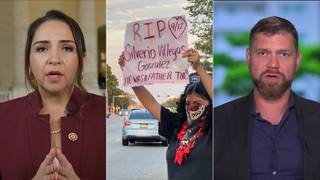
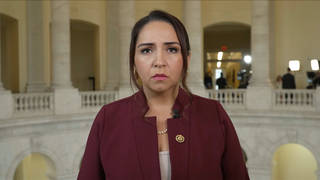
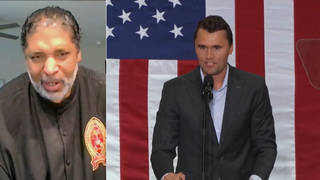
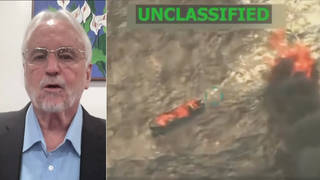





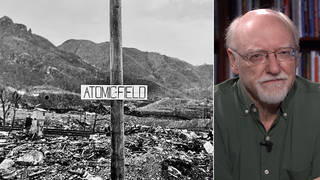
Media Options